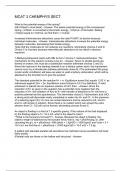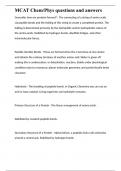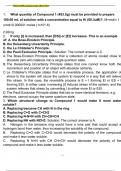Mcat chemphys - Study guides, Class notes & Summaries
Looking for the best study guides, study notes and summaries about Mcat chemphys? On this page you'll find 14 study documents about Mcat chemphys.
All 14 results
Sort by
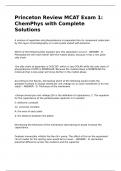
-
Princeton Review MCAT Exam 1: ChemPhys with Complete Solutions
- Exam (elaborations) • 10 pages • 2024
- Available in package deal
-
- $11.49
- + learn more
Princeton Review MCAT Exam 1: ChemPhys with Complete SolutionsPrinceton Review MCAT Exam 1: ChemPhys with Complete SolutionsPrinceton Review MCAT Exam 1: ChemPhys with Complete SolutionsPrinceton Review MCAT Exam 1: ChemPhys with Complete Solutions A mixture of aspartate and phenylalanine is separated into its component molecules by thin layer chromatography on a silica plate eluted with benzene. Which of the following best explains why this separation occurs? - ANSWER - D. Phenylalanine wil...
MCAT 3 CHEMPHYS SECT.
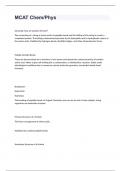
-
MCAT Chem/Phys questions n answers /passed
- Exam (elaborations) • 37 pages • 2024
- Available in package deal
-
- $19.99
- + learn more
MCAT Chem/PhysGenerally, how are proteins formed? The connecting of a string of amino acids via peptide bonds and the folding of this string to create a completed protein. The folding is determined primarily by the hydrophilic and/or hydrophobic nature of the amino acids. Stabilized by hydrogen bonds, disulfide bridges, and other intramolecular forces. Peptide (Amide) Bonds These are formed when the n-terminus of one amino acid attacks the carboxy terminus of another amino acid. Water is ...
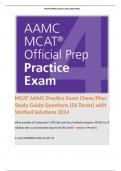
-
MCAT AAMC Practice Exam Chem/Phys Study Guide Questions (56 Terms) with Verified Solutions 2024
- Exam (elaborations) • 35 pages • 2024
- Available in package deal
-
- $9.99
- + learn more
MCAT AAMC Practice Exam Chem/Phys Study Guide Questions (56 Terms) with Verified Solutions 2024
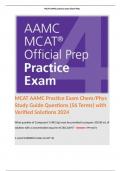
-
MCAT AAMC Practice Exam Chem/Phys Study Guide Questions (56 Terms) with Verified Solutions 2024
- Exam (elaborations) • 35 pages • 2024
- Available in package deal
-
- $9.79
- + learn more
MCAT AAMC Practice Exam Chem/Phys Study Guide Questions (56 Terms) with Verified Solutions 2024
MCAT Chem/Phys questions and answers
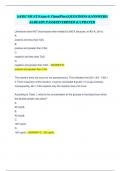
-
AAMC MCAT Exam 4- Chem/Phys| QUESTIONS &ANSWERS| ALREADY PASSED|VERIFIED & UPDATED
- Exam (elaborations) • 10 pages • 2023
-
- $12.49
- + learn more
AAMC MCAT Exam 4- Chem/Phys| QUESTIONS &ANSWERS| ALREADY PASSED|VERIFIED & UPDATED Limestone does NOT decompose when heated to 900 K because, at 900 K, ΔH is: A. positive and less than TΔS. B. positive and greater than TΔS. C. negative and less than TΔS. D. negative and greater than TΔS. - ANSWER B. positive and greater than TΔS. The reaction does not occur (is not spontaneous). This indicates that ΔG = ΔH - TΔS > 0. From inspection of the reaction, it can be concluded t...
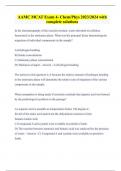
-
AAMC MCAT Exam 4- Chem/Phys 2023/2024 with complete solutions
- Exam (elaborations) • 108 pages • 2023
-
- $10.99
- + learn more
In the chromatography of the reaction mixture, water absorbed on cellulose functioned as the stationary phase. What was the principal factor determining the migration of individual components in the sample? A) Hydrogen bonding B) Solute concentration C) Stationary phase concentration D) Thickness of paper - Answer - A) Hydrogen bonding The answer to this question is A because the relative amount of hydrogen bonding to the stationary phase will determine the relative rate of migration o...
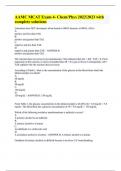
-
AAMC MCAT Exam 4- Chem/Phys 2022/2023 with complete solutions
- Exam (elaborations) • 7 pages • 2023
-
- $7.19
- + learn more
Limestone does NOT decompose when heated to 900 K because, at 900 K, ΔH is: A. positive and less than TΔS. B. positive and greater than TΔS. C. negative and less than TΔS. D. negative and greater than TΔS. - ANSWER B. positive and greater than TΔS. The reaction does not occur (is not spontaneous). This indicates that ΔG = ΔH - TΔS > 0. From inspection of the reaction, it can be concluded that ΔS > 0 (a gas evolves). Consequently, ΔH > TΔS explains why the reactio...
MCAT AAMC Practice Exam Chem/Phys Study Guide Questions (56 Terms) with Verified Solutions 2024

$6.50 for your textbook summary multiplied by 100 fellow students... Do the math: that's a lot of money! Don't be a thief of your own wallet and start uploading yours now. Discover all about earning on Stuvia

